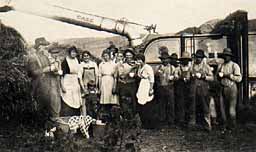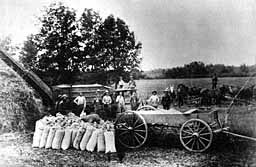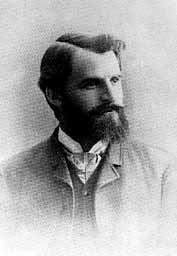

 |
 |
|
The wind blew cold and the clouds were flying across the bright blue sky, the straw glistened in the sun, the machine howled, the dust flew, the whip cracked, and the men worked like beavers to get the sheaves to the feeder, and to keep the straw and wheat away from the tail-end of the machine. These fellows, wallowing to their waists in the chaff, did so for the amusement of the boys, and for no other reason. |
|
|
They were always amused by the man who stood in the midst of the thick dust and the flying chaff at the head of the stacker, who took and threw away the endless cataract of straw as if it were all play. His teeth shown like those of a negro out of his dust blackened face, and his shirt was wet with sweat, but he motioned for more straw, and the feeder, accepting the challenge, motioned for more speed, and so the driver swung his lash and yelled at the straining horses, the pitchers buckled to, the sleepy growl of the cylinder rose to a howl, the wheat rushed out in a stream as "big as a stove-pipe," and the carriers were forced to trot back and forth from the granary like mad, and to generally "hump themselves" in order to keep the grain from piling up around the measurer where Ellis stood disconsolately holding sacks for old man Smith. When the children got tired of wallowing in the straw, and with turning somersaults therein, they went down to help Rover catch the rats which were uncovered by the pitchers when they reached the stack bottom. It was all play to Lincoln, just as it had once been to the others. The horses, with their straining, outstretched necks, the loud and cheery shouts, the whistling of the driver, the roar and hum of the machinery, the flourishing of the forks, the supple movements of the brawny arms, the shouts of the threshers to one another, all blended with the wild sound of the wind overhead in the creaking branches of the oaks, formed a splendid drama for his recording brain. But for the boy who was forced to stand with old Daddy Smith in the flying dust beside the machine, it was a bad play. He was a part of the machine-of the crew. His liberty to come and go was gone. When Daddy was grinning at him out of the gray dust and the swirling chaff, the wheat beards were crawling down his back, scratching and rasping. His ears were stunned by the noise of the cylinder and the howl of the balance-wheel, and it did not help him any to have the old man say in a rasping voice, "Never mind the chaff, sonny-it ain't pizen." |
 Horse Sweep Power |
|
Whirr-bang! Something had gone into the cylinder, making the feeder dodge to escape the flying teeth, and the men seized the horses to stop the machine. The men then hailed such accidents with delight, for it afforded them a few minutes' rest while the crew put some new teeth in the "concave." They had time to unbutton their shirts and get some of the beards out of their necks, to take a drink of water, and to let the deafness go out of their ears. At such times also some of the young fellows were sure to have a wrestling or a lifting match, and all kinds of jokes flew about. The man at the straw-stack leaned indolently on his fork and asked the feeder sarcastically if that was the best he could do, and remarked, "It's gettin' chilly up here. Guess I'll have to go home and get my kid gloves." To this David laughingly responded, "I'll warm your carcass with a rope if you don't shut up," all of which gave the boys infinite delight. But the work began again, and Ellis was forced to take his place as regularly as the other men. As the sun neared the zenith, he looked often up to it-so often in fact that Daddy, observing it, cackled in great amusement, "Think you c'n hurry it along, sonny? The watched pot never boils, remember!"-which made the boy so angry he nearly kicked the old man on the shin. But at last the call for dinner sounded, the driver began to shout, "Whoa there, boys," to the teams and to hold his long whip before their eyes in order to convince them that he really meant "Whoa." The pitchers stuck their forks down in the stack and leaped to the ground; Billy, the band-cutter, drew from his wrist the string of his big knife; the men slid down from the straw-pile and a race began among the teamsters to see who should be first unhitched and at the watering trough and at the table. |
|
|
It was always a splendid and dramatic moment to the boys as the men crowded round the well to wash, shouting, joking, cuffing each other, sloshing themselves with water, and accusing each other of having blackened the towel by using it to wash with rather than to wipe with. Mrs. Stewart and the hired girl, and generally some of the neighbors' wives (who changed "works" also) stood ready to bring on the food as soon as the men were seated. The table had been lengthened to its utmost and pieced out with the kitchen table, which usually was not of the same height, and planks had been laid for seats on stout kitchen chairs at each side. The men came in with noisy rush and took seats wherever they could find them, and their attack on "boiled taters and chicken" should have been appalling to the women, but it was not. They smiled to see them eat. A single slash at a boiled potato, followed by two motions, and it disappeared. Grimy fingers lifted a leg of chicken to a wide mouth, and two snaps laid it bare as a slate pencil. To the children standing in the corner waiting, it seemed that every smitch of the dinner was going and that nothing would be left when the men got through, but there was, for food was plentiful. At last even the "gantest" of them filled up. Even Len had his limits, and something remained for the children and the women, who sat down at the second table, while David and William and Len returned to the machine to put everything in order, to sew the belts, or take a bent tooth out of the "concave." Len, however, managed to return two or three times in order to have his jokes with the hired girl, who enjoyed it quite as much as he did. |
 |
|
In the short days of October only a brief nooning was possible, and as soon as the horses had finished their oats, the roar and hum of the machine began again and continued steadily all afternoon. Owen and Rover continued their campaign upon the rats which inhabited the bottom of the stacks and great was their excitement as the men reached the last dozen sheaves. Rover barked and Owen screamed half in fear and half from a boy's savage delight in killing things, and very few rats escaped their combined efforts. To Ellis the afternoon seemed endless. His arms grew tired with holding the sacks against the lip of the half bushel, and his fingers grew sore with the rasp of the rough canvas out of which the sacks were made. When he thought of the number of times he must repeat these actions, his heart was numb with weariness. |
|
|
All things have an end! By and by the sun grew big and red, night began to fall and the wind to die down. Through the falling gloom the machine boomed steadily with a new sound, a sort of solemn roar, rising at intervals to a rattling yell as the cylinder ran empty. The men were working silently, sullenly, moving dim and strange; the pitchers on the stack, the feeder on the platform, and especially the workers on the high straw-pile, seemed afar off to Lincoln's eyes. The gray dust covered the faces of those near by, changing them into something mysterious and sad. At last he heard the welcome cry, "Turn out!" The men raised glad answer and threw aside their forks. Again came the gradual slowing down of the motion, while the driver called in a gentle, soothing voice: "Whoa, lads! Steady, boys, Whoa, now!" But the horses had been going on so long and so steadily that they checked their speed with difficulty. The men slid from the stacks, and seizing the ends of the sweeps, held them; but even after the power was still, the cylinder went on, until David, calling for a last sheaf, threw it in its open maw, choking it into silence. Then came the sound of dropping chains and iron rods, and the thud of the hoofs as the horses walked with laggard gait and down-falling heads to the barn. The men were more subdued than at dinner, washing with greater care, brushing the dust from their beards and clothes. The air was still and cool, the wind was gone, the sky deep, cloudless blue. |
 |
|
The evening meal was more attractive to the boys than dinner. The table was lighted with a kerosene lamp, and the clean white linen, the fragrant dishes, the women flying about with steaming platters, all seemed very dramatic, very cheering to Lincoln as well as to the men who came into the light and warmth with aching muscles and empty stomachs. There was always a good deal of talk at supper, but it was gentler than at the dinner hour. The younger fellows had their jokes, of course, and watched the hired girl attentively, while the old fellows discussed the day's yield of grain and the matters of the township. Ellis was now allowed a place at the first table like a first-class hand. The pie and the doughnuts and the coffee disappeared as fast as they could be brought, which seemed to please Mrs. Stewart, who said, "Goodness sakes, yes; eat all you want. They was made to eat." The men were all, or nearly all, neighbors, or hands hired by the month, and some were like members of the family. Mrs. Stewart treated them all like visitors and not like hired help. No one feared a genuine rudeness from the other. After they had eaten their supper it was a great pleasure to the boys to go out to the barn and shed (all wonderfully changed now to their minds by the great new stack of straw), there to listen to the stories or jolly remarks of the men as they curried their tired horses munching busily at their hay, too weary to move a muscle otherwise, but enjoying the rubbing down which the men gave them with wisps of straws held in each hand. The light from the kitchen was very welcome, and how bright and warm it was with the mother's merry voice and smiling face where the women were moving to and fro, and talking even more busily than they worked. Sometimes in these old-fashioned days, after the supper table was cleared out of the way, and the men returned to the house, an hour or two of delicious merry making ended the day. Perhaps two or three of the sisters of the young men had dropped in, and the boys themselves were in no hurry to get home. Around the fire the older men sat to tell stories while the girls trudged in and out, finishing up the dishes and getting the materials ready for breakfast. With speechless content Lincoln sat to listen to stories of bears and Indians and logging on the Wisconsin, and other tales of frontier life, and then at last, after beseeching, David opened the violin box and played. Strange how those giant hands became supple to the strings and bow. All day they bad been handling the fierce straw or were covered with the grease and dirt of the machine, yet now they drew from the violin the wildest, weirdest strains, thrilling Norse folk songs, Swedish dances and love ballads, mournful, sensuous, and seductive. Lincoln could not understand why David's tunes had that sad, sweet quality, but he could sit and listen to them all night long. Oh, those rare days and rarer nights! How fine they were then-and how mellow they are growing now as the slow-paced years drop a golden mist upon them. From this distance they seem so dear that my heart aches to relive them. They were so wholesome and so carefree the world seems poorer for the change. |
 Hamlin Garland |